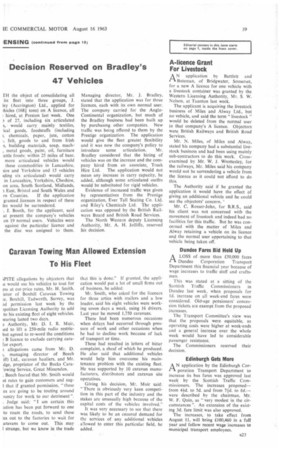Decision Reserved on Bradley's 47 Vehicles
Page 41

If you've noticed an error in this article please click here to report it so we can fix it.
TH the object of consolidating all its fleet into three groups, J. ley (Accrington) -Ltd., applied for ;hides (1681 tons) on A licence, all ; hired, at Preston last week. One
of 27, including six articulated s,• would carry mainly textiles, ical goods, foodstuffs (including chemicals, paper, jute, cotton felt, goods to and from Irish s, building materials, soap, mach, metal goods, paint, oil, furniture .attle foods: within 25 miles of base. more articulated vehicles would these commodities in Lancashire, tire and Yorkshire and 15 vehicles iding six articulated) would carry in Lancashire, Yorkshire, Cheshire, on area, South Scotland, Midlands, East, Bristol and South Wales and rn Counties. If the application granted .licences inL respect of these les would be surrendered.
J. Booth, for the applicant, said at present the company's vehicles on 19 normal users. .Vehicles were against the particular licence and the disc was assigned to them. Managing director, Mr. J. Bradley, stated that the application was for three licences, each with its own normal user. The company carried for the AngloContinental organization, but much of the Bradley business had been built up by purchasing other companies. New traffic was being offered to them by the Prestige organization. The application would give the fleet greater flexibility and it was now the company's policy to introduce some articulation. Mr. Bradley considered that the hiring of vehicles was on the increase and the company hired from an associate, Truck Hire Ltd. The application would not mean any increase in carry capacity, he added, although some articulated outfits would be substituted for rigid vehicles.
Evidence of increased traffic was given by representatives from the Prestige organization, Ever Tall Seating Co. Ltd. and Riley's Chemicals Ltd. The application was opposed by the British Railways Board and British Road Services.
The North Western deputy Licensing Authority, Mr. A. H. Jolliffe, reserved his decision.












































































































